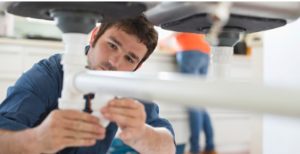Plumbers are trade workers specialising in repairing and installing water supply and drainage piping systems for both homes and commercial properties, installing fire sprinkler systems, and diagnosing plumbing issues to come up with creative solutions to resolve them. They may work in any setting, such as homes or office buildings.
 This career option is ideal for people who love working with both their hands and minds while at the same time enjoying interaction with other people daily.
This career option is ideal for people who love working with both their hands and minds while at the same time enjoying interaction with other people daily.
Job description
Plumber and gas fitters Elizabeth services are an indispensable element of modern society, providing access to clean water and eliminating waste efficiently. Without their contributions, daily life would be much harder; at the same time, plumbers play an essential role in safeguarding people’s health and well-being by ensuring all systems operate as planned.
Plumbers’ primary duties involve installing, repairing, and maintaining plumbing systems in residential, commercial, and industrial settings. Their skills must include exceptional problem-solving to identify and address issues as soon as they arise. Furthermore, they regularly interact with customers to understand their needs and offer guidance and advice.
Plumbers work closely with architects, engineers, and construction professionals to ensure each project’s success. Communication must be clear and concise to ensure this. Furthermore, understanding blueprints, building codes, specifications, and blueprints must also be done without error to complete tasks successfully. Lastly, they must work with various materials, from copper and plastic to steel and concrete, to do their jobs successfully.
Education and training requirements
Plumbers require a high school diploma to enter the profession, and most opt for an apprenticeship program sponsored by unions and trade associations that lasts four to five years and provides approximately 246 hours of technical training annually under supervision from a senior tradesperson. Classes on safety, plumbing codes and regulations, and blueprint reading are also offered. An aptitude exam and panel interview precede beginning work at 45 percent of minimum wages before wages steadily increase yearly.
Plumber and gas fitters Elizabeth specialises in commercial or industrial settings, managing a larger network of pipes and more complicated equipment. Working closely with architects and construction teams, these plumbers must plan, design and construct plumbing systems that serve multiple occupants. Effective communication with assistants, managers, business owners and material suppliers must also be key for completing projects on time.
Plumbers must also be able to solve problems quickly and effectively in emergencies, as they often face urgent repair jobs on sewage systems that contain microbes that cause diseases like cholera, typhoid and hepatitis. Furthermore, they should possess skills in soldering/crimping pipe fittings in tight spaces and working efficiently in cramped spaces.
Work environment
Plumbers work in various environments, including commercial, industrial and residential settings. They may also be called upon out-of-hours for emergencies like burst pipes. Although their work can be demanding at times, it can also be immensely satisfying if they enjoy working with their hands and possess physical fitness.
Begin their career as plumbers by enrolling in an apprenticeship program. These 4-5-year programs combine on-the-job experience with classroom learning. Apprentices must possess either a high school diploma or GED certificate and complete at least 2,000 hours of classroom instruction to qualify; additionally, this experience will teach technical plumbing skills and industry safety guidelines.
Some of the more prevalent hazards for plumbers include exposure to raw sewage, electrical hazards and physical injuries. Many of these hazards can be avoided by adhering to health and safety guidelines, maintaining good work practices and avoiding unsafe behaviour.
Salary
Plumbing jobs offer stable income opportunities. Highly sought-after and in high demand, the plumbing profession requires only a high school diploma or GED certificate as entry points into technical courses and an apprenticeship – offering thousands of dollars of savings compared to the costs of undergraduate studies. Furthermore, master plumber certification allows for even higher earnings potential.
Plumbers not only receive competitive hourly rates but can also receive bonus payments based on company performance. Bonus payments typically occur annually or quarterly and serve as an excellent motivator to motivate and spur employees to perform well.
Bonus pay can boost employee morale and enhance productivity and profitability for a company, helping retain top talent. Plumbers can earn additional funds by taking part in additional training, exploring business opportunities, or getting certified in their field.